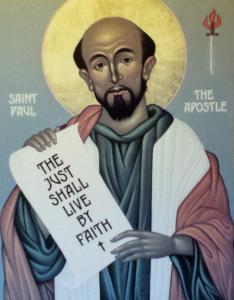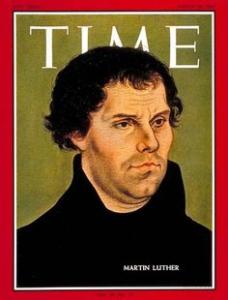Faith alone belongs to the gospel. And Luther was right!

Patheos columnist Dennis Knapp gives us 3 reasons why Faith Alone is NOT the gospel and why Luther was wrong. I would like to respond by contending that faith alone belongs to the gospel of Jesus Christ. Further, I contend that Luther was right when touting the Reformation slogan, sola fides, by faith alone.
Knapp is not unique in his rejection of Luther. Patheos columnist David Armstrong, similarly objects. “So many Protestants want to define the gospel in the strict sense of ‘justification by faith alone,’ when the Bible itself is very explicit and clear that this is not the case at all.”
So, it appears we must stop touting “faith alone” or sola fides because it’s not biblical. Right? So it seems. But let me argue to the contrary.
First, what is the gospel?

Dennis Knapp did not provide us with a definition of the gospel. So, I will. The gospel is the story of Jesus Christ told with its significance. This is what the New Testament Gospels – Mathew, Mark, Luke, and John – do. They tell us the story of Jesus and tell us this is the most important story in history. Saint Paul and the rest of the biblical writers draw out the significance even further.
1 Peter 3:18-22, for example, offers both the story of Jesus and its significance in a single paragraph. The righteous or just Jesus Christ dies for the unrighteous or unjust sinner. This results in the forgiveness of sins—Xριστòϛ ἅπαζ περὶ ἀµαρτιϖν ἒπαθεν (or ἀπέθανεν), δίκαιοϛ ὑπὲρ ἀδίκων—in order that he might bring us to God. That’s the gospel message.
Just a BTW. When talking about the four Gospels, the ‘G’ should be capitalized because it belongs to a book’s title. When talking about the gospel of Jesus Christ, it’s best to use a lower case ‘g’. Knapp seems to have confused the two.
Second, does faith alone belong to the gospel according to Scripture?
Does faith alone belong to the gospel according to Scripture? It certainly seems essential to what’s frequently called the “gospel in miniature” (John 3:16).
“For God so loved the world that he gave his only Son, so that everyone who believes [πιστεωύν] in him may not perish but may have eternal life” (John 3:16).
We can translate πιστεωύν as “believe” or to have “faith.”

Now Dennis Knapp is not concerned about faith per se, to be sure. He’s denying that faith alone is scriptural. Knapp wants to assert that faith plus something more is required for justification and salvation. What does St. Paul say?
“But now that faith has come, we are no longer subject to a disciplinarian, for in Christ Jesus you are all children of God through faith” (Galatians 3:25).
The word, alone, does not actually appear here. But St. Paul is telling us in no uncertain terms that it’s faith alone – and not God’s law – that renders us just and saved.
Curiously, St. James seems to contradict St. Paul.
“You see that faith was active along with his [Abraham’s] works, and faith was brought to completion by the works…. You see that a person is justified by works and not by faith alone” (James 2:22,24).
According to James, faith actively initiates works of love and completes them. More. The works of love actually round out faith. They complete faith. Paul would agree, even if Paul uses the terms slightly differently. Paul seems to distinguish faith and love while James conflates them. The dynamic of faith, it seems to me, is shared by both Paul and James.
“The only thing that counts is faith working through love” (Galatians 5:5).
So, how would you handle the biblical testimony here?
Third, did Martin Luther actually teach that faith alone belongs to the gospel?
Did Martin Luther actually teach that faith alone belongs to the gospel? You betcha! And he did so without any pussy footing or ambiguity.
“Faith alone without works justifies, frees, and saves” (Luther, The Freedom of a Christian 2015-2020).

What is Luther doing here? Is he agreeing with Paul and disagreeing with James? Perhaps we can sort this out by asking: just what is faith anyway? What is there about faith that ties it to justification? To salvation?
Contemporary Luther scholar Oswald Bayer tell us exactly what is going on here. Luther is emphasizing that your and my justification and hence salvation comes to us as a gift of God’s grace. We realize and accept and celebrate God’s grace within our faith. This means that within faith there is a passive or receiving dimension. “When I hear the gospel, that I have been accepted and adopted by God for the sake of Jesus Christ in the Holy Spirit, I am radically passive. I receive that which is given to me as a ‘categorical gift’” (Bayer, 2007, p. 11). To say “faith alone” or sola fide is to draw our attention toward the passive dimension of our relationship with the redeeming God.
Faith alone saves, to be sure. But faith is never found alone. St. Paul reminds us that “these three abide: faith, hope and love. But the greatest of these is love” (! Corinthians 13:13).
Fourth, just what is faith?
I find three dimensions within faith worth pointing out. First, we understand faith as belief. When we recite the Nicene Creed, we begin with credo, “I believe.” To believe true things is to have faith. To believe is to do something, to be sure. It’s active. Not passive.
Secondly, we can understand faith as trust. Jesus calls us to trust God. But trusting is also something we do. It’s active. Not passive.
What is there within faith then that is passive? Here is my answer: faith as the real presence of Christ (Peters, 2015, p. Chapter 8). The Holy Spirit makes the Easter Christ present to you and me within our faith. Whereas belief and trust are things we do, the presence of Christ is something the Holy Spirit makes happen.
Here is St. Paul.
“Examine yourselves to see whether you are in faith; test yourselves. Do you not realize that Christ Jesus is in you—unless, of course, you fail the test?” (2 Corinthians 13:5)
And St. Paul again.
“And if the Spirit of him who raised Jesus from the dead is living in you, he who raised Christ from the dead will also give life to your mortal bodies because of his Spirit who lives in you” (Romans 8:11)
Here is Luther’s interpretation of St. Paul.
“It [faith] takes hold of Christ in such a way that Christ is the object of faith, or rather not the object but, so to speak, the One who is present in the faith itself” (Luther, LW, 1955-1986, p. 26: 129).
The Holy Spirit is active in our faith where you and I are passive. We receive what God gives. And we might even act to say, “thank you.”
Conclusion
Luther scholar Kirsi Stjerna makes it forcebly clear: “justification by faith by grace is a free gift” (Stjerna 2021, 181).
Yes indeed, faith alone belongs to the gospel. And Luther was right! There is a dimension within faith that passively receives and celebrates the presence of the living Christ. The presence of Christ comes to us as a gift, a gift delivered by the Holy Spirit. This presence is not something we have worked on making happen. This presence is not a product of our love. Rather, this gift of divine presence comes first. It comes to us in our passivity. When our faith bubbles over in love for God and love for neighbor, then we can rightly say that we are actively pursuing good works.
It is faith alone that justifies. But genuine faith is never alone. Love and hope keep faith company.
Patheos ST 2026. Faith alone belongs to the gospel. And Luther was right!
ST 2005 What is Justification by Faith?
▓

Ted Peters is a Lutheran pastor and emeritus seminary professor, teaching theology and ethics. He is author of Short Prayers and The Cosmic Self. His one volume systematic theology is now in its 3rd edition, God—The World’s Future (Fortress 2015). His book, God in Cosmic History, traces the rise of the Axial religions 2500 years ago. He has undertaken a thorough examination of the sin-and-grace dialectic in two works, Sin: Radical Evil in Soul and Society (Eerdmans 1994) and Sin Boldly! (Fortress 2015). Watch for his forthcoming, The Voice of Christian Public Theology (ATF 2022). See his website: TedsTimelyTake.com. Ted Peters’ fictional series of espionage thrillers feature Leona Foxx, a hybrid woman who is both a spy and a parish pastor.
▓
References
Bayer, O. (2007). With Luther in the Present. Lutheran Quarterly 21:1, 1-19.
Luther, M. (1955-1986). LW. Luther’s Works, American Edition, 55 Volumes: St. Louis and Minneapolis: Concordia and Fortress.
Luther, M. (2015-2020). The Freedom of a Christian. In M. Luther, The Annotated Luther, 5 Volumes (pp. 1: 467-518). Minneapolis MN: Fortress Press.
Peters, T. (2015). God–The World’s Future: Systematic Theology for a New Era (3rd ed.). Minneapolis MN: Fortress Press.
Stjerna, K. (2021). Lutheran Theology: A Grammar of Faith. Edinburgh: T & T Clark.














